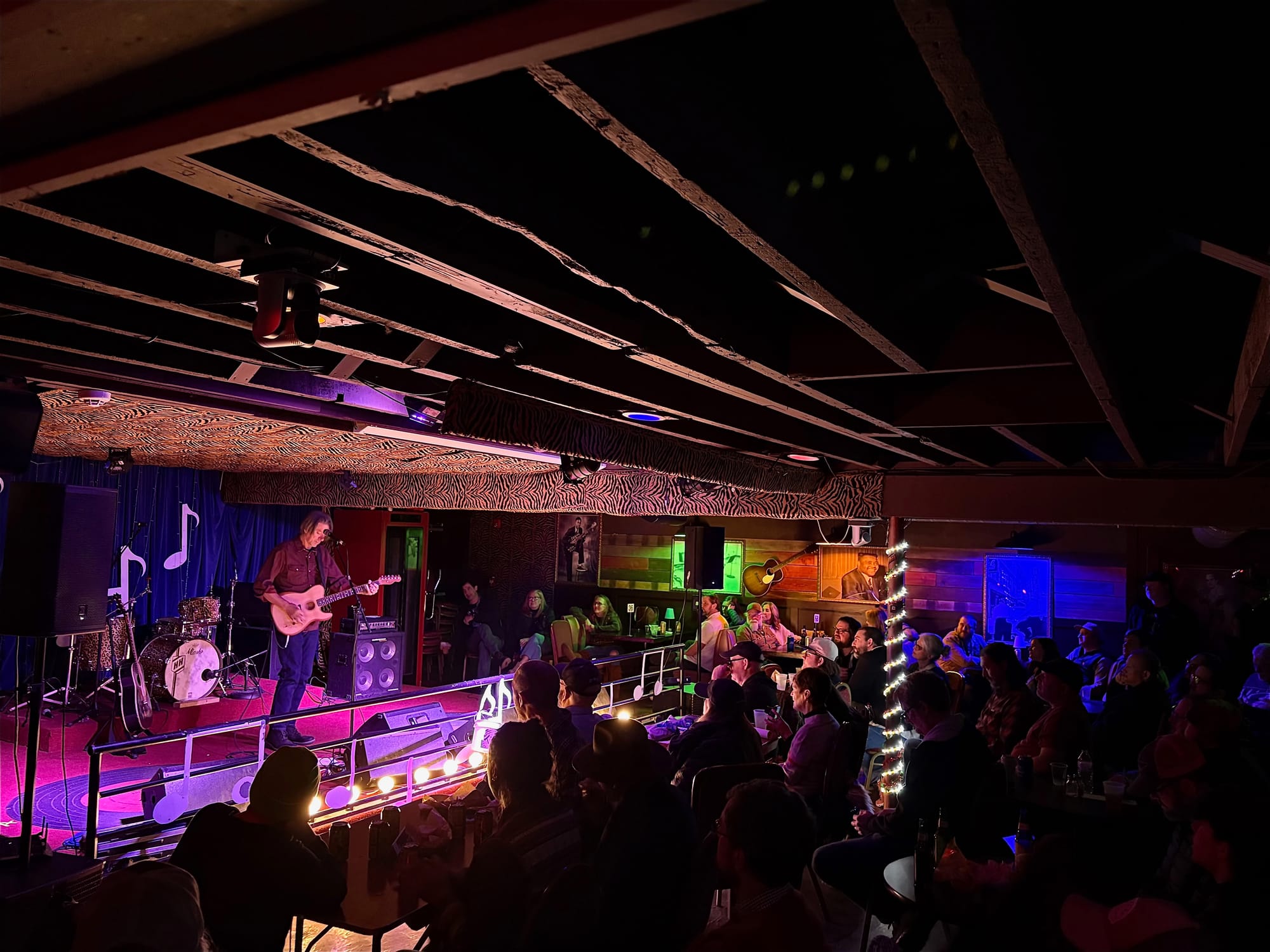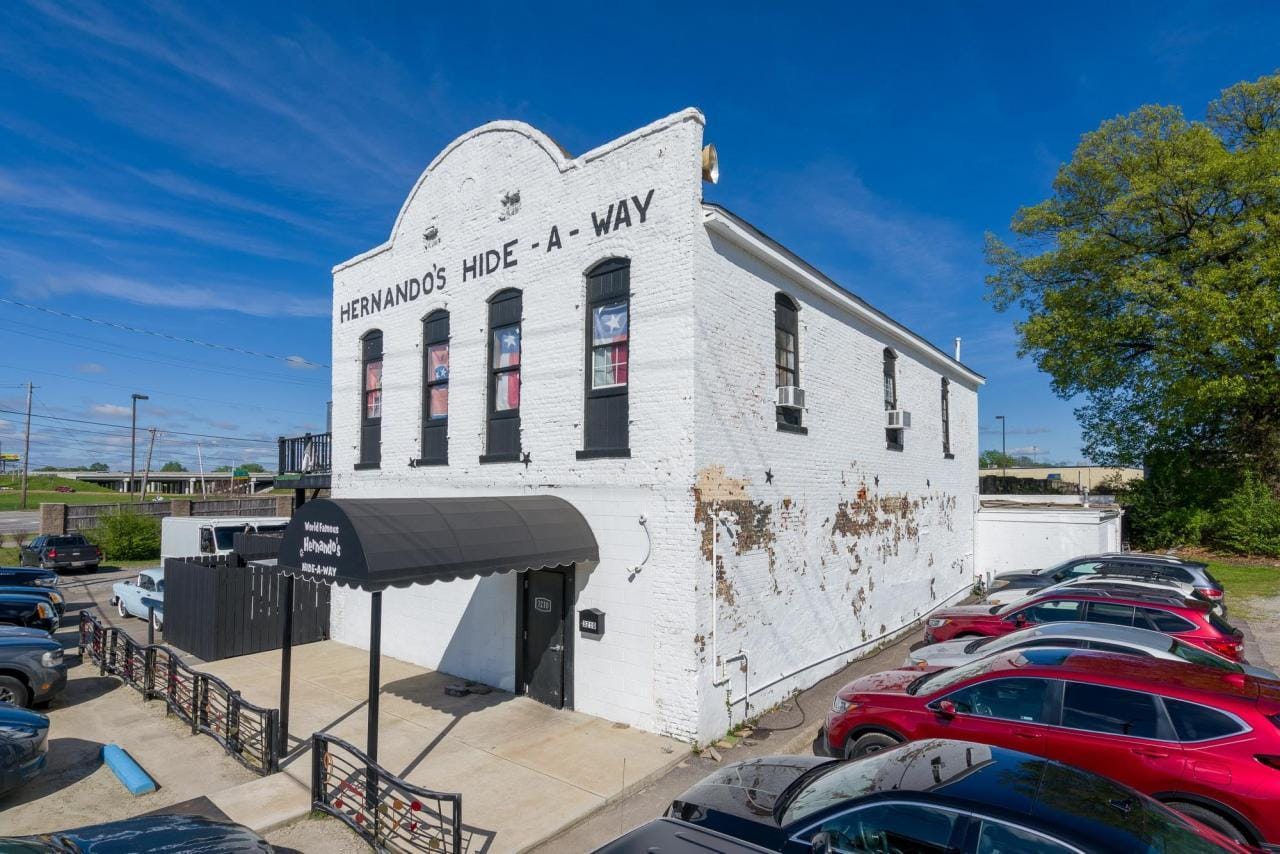Hernando’s Hideaway bills itself on its website as “The last Old Schoolin', No Foolin', Beer Drinkin', Shot Shootin', Roadhouse, Honky Tonk Lounge!'” I don’t know about all of that, there has clearly been an effort not to clean it up too much. To the left as soon as you walk in: an old cigarette machine, framed photos of Jerry Lee Lewis and Carl Perkins hung slightly askew, the bathrooms; to the right, Naugahyde leather booths around small formica tables. A patina of grease smoke under fluorescent lights blurs everything like an old photograph.
Keep walking: the music room is in the back. A long bar against one wall and dimmer lighting. There’s a stage that stands maybe a foot off the ground with black, cast iron fencing in front of it, adorned with musical notes. The house drum kit is all in cheetah print and the ceiling is covered in zebra-striped drapes hung so low they could tousle your hair.
The room is small and feels even smaller because it’s packed. What’s the legal capacity of Hernando’s Hideaway? It can’t be 100 souls, and there must be twice that many in here by the time we arrive. Plenty of men, about my age, dressed not unlike me, and their wive and girlfriends, talking about their plans for the upcoming holiday. I see some people I know, but we’re wedged in so tight that hugs or even face-to-face hellos are difficult. More people keep coming in. It feels like we’ve boarded a ship and we’re headed to war.

A few minutes past 8 o’clock, Mike Cooley saunters out with an acoustic guitar.
John Michael Cooley, born in September of 1966 in Tuscumbia, Alabama. Tuscumbia was renamed in 1822 after Tashka Ambi, a Cherokee chief, but its first name was “Ococoposa,” which is a Chickasaw-Choctaw word that means “cold water.” Helen Keller is from Tuscumbia, and she learned about water by having it poured on one of her hands while Anne Sullivan spelled W-A-T-E-R into her other palm. Tuscumbia is a modest place but people there have ways of making themselves understood.
Since the early 1990s, Cooley’s day job has been playing lead guitar and writing a few songs for the Drive-By Truckers, a band he cofounded with fellow Alabaman Patterson Hood. Occasionally, when DBT is on a tour break, Patterson and Mike will do solo acoustic tours.Patterson actually played Hernando’s exactly one year ago, which Mike acknowledges early in his set. “There are more people here for you than there were for him!” someone shouts at one point.
Cooley smiles; he knows that probably isn’t true, but the gesture is nice. “Well, la-di-da!" he says.
Cooley is all skin and bones and floppy hair and kind, tired eyes. He tends to be more reticent, a little cooler, a little quieter. Keith Richards’ genetic good luck, Townes Van Zandt’s empathy, and Leonard Cohen’s bemused confidence that everything around us is comically, cosmically fucked up.
He’s not DBT’s primary songwriter, so you get the feeling that when he’s only given three or four songs per album to make his point, he’s got to make every stanza, every line, every word count for a lot. He doesn’t waste words, but they do hit you like buckshot.

Mike will end his set with “Marry Me,” off of 2002’s DBT album Decoration Day, which includes lines like “I'd rather be your fool nowhere than go somewhere and be no one's.” Earlier in the night, he’ll get a cheer by singing the Memphis-set “Carl Perkins’ Cadillac,” and the line “Making money you can't spend ain't what being dead's about. You gave me all but one good reason not to do all the things you did. Now Cadillacs are fiberglass – if you were me you'd call it quits.”
Speaking of cars, Mike does not sing my favorite song of his, “3 Dimes Down,” which has a verse that starts: “If the part about being who he was didn't help Tom get loose, what's a guy without a T. gonna get? Totally screwed, while chicken wing puke eats the candy apple red off his Corvette.” On and on, it’s like this throughout his whole catalog. The listener has barely any time to recover from one line before getting lacerated by the next one.
About three-quarters of his way into his set, he sings a song called “Uncle Frank,” which appears in its original form on DBT’s second album, Pizza Deliverance (it was reprised in a different arrangement on their 2009 rarities collection, The Fine Print.) The song’s title character is a proud, if lonely, man who loses his North Alabama home to eminent domain and subsequently takes his own life. Six verses, no chorus. “Just a rope around his neck and the kitchen table turned on its side.” The song implies that Frank was paid for his property before the feds told him to leave, but what is the value of a man who owns only money but no home? Who can’t work? Who is told he can’t hold something he bought fair and square?
In the 1940s, the Tennessee Valley Authority seized the currents of southern Appalachia and the Shoals area where Cooley grew up and used it to electrify a great deal of the south with breathtaking speed. Few people today would claim that the TVA wasn’t a net positive for the region, utterly transforming the lives of generations of southerners. Cooley doesn’t dispute that, but it’s not really his concern. He’s thinking about the people who happened to be in the way of that progress and couldn’t find their footing as the future started to move faster and faster. People like Frank.Ironically, in the song, Frank bought his land specifically because its undesirability made it affordable – “15 rocky acres, figured no one else would want.” It turns out that bureaucrats, developers, and politicians were playing an entirely different game all along. They needed power, and they weren’t going to stumble over a few rocks in the way.
It’s a 15 minute drive from Herenando’s parking lot to President’s Island, so named at the turn of the 19th century because of its size. Nathan Bedford Forrest leased it from the state of Tennessee to build a penal farm there, and historians suspect that some tainted island water gave General Forrest the dysentery that killed him.
In the 1940s, the City of Memphis annexed the island and gave it a new destiny: industrial development. Currently, 1,200 of its 7,500 acres are zoned for that, making it home to some 200 companies and 4,000 employees. The latest of these companies, xAI, moved in earlier this year to take over an abandoned washing machine factory.
President’s Island abuts an area known broadly as South Memphis which includes several distinct neighborhoods: Boxtown, Riverside, Riverview-Kansas, Mallory Heights, and many others. Their ZIP code, 38126, is the poorest in the whole city; the area’s median household income is around $30,000 per year. Elon Musk, who owns xAI, has made $4 billion every day since November 5 and on the night of the Mike Cooley show, was worth around $486 billion.

Since September 2024, xAI has operated the world’s largest supercomputer on President’s Island, running 200,000 chips, which is evidently a lot, but not as many as it wants to run. Earlier in the week, Musk’s staff told a crowd of local business leaders that they wanted to expand to 1 million chips. According to a report in the Daily Memphian, “The Tennessee Valley Authority’s regional power system cannot likely accommodate hundreds more megawatts of growth — new projects of more than 100 megawatts require TVA board approval. MLGW’s distribution infrastructure would not support such an expansion in Southwest Memphis. XAI’s planned growth could consume hundreds of megawatts or maybe 1,000.”
(In my research for this story, Google’s own AI chatbot helpfully told me that “xAI chose Memphis for several reasons, including: Reliable power grid, Ability to create a wastewater facility, Proximity to the Mississippi River, Ample land, and Pro-business climate.” I’ve left the weird capitalization uncorrected but added my own emphasis.)
The need for power begets the need for more power. To wit: when it announced an expansion in 2022, Chattanooga’s Volkswagen plant said that it could eventually use 58 megawatts of power annually, which would make it EPB’s largest local customer. By contrast, according to energy news outlet Latitude Media, “[D]ata centers in the U.S. used 150 million megawatt-hours in 2023… That’s the equivalent of the average annual consumption of 14 million households.” An analysis by Deloitte predicts that “AI data centers’ annual power consumption is expected to reach 90 terawatt-hours by 2026…roughly a tenfold increase from 2022 levels.”
What the fuck is a terawatt?
I don’t know. It sounds like a lot.
I doubt Mike Cooley knows either, but a lot of this sounds all-too familiar. Mike sings about people for whom the social contract is usually written on tissue paper, and after it's been shredded, they still have to be alive for a long time. The lovelorn delinquent of “Zip City,” the sad-sack businessman at the strip club in “Birthday Boy,” the disgruntled fast food worker in “Shit Shots Count,” the past-his-prime hard rocker in “Self Destructive Zones.” I could go on but you get the point. Even his love songs are soured with disappointment, resignation, a need to distract one’s self from the opportunities you know you’ve missed.
One million computer chips will require several terawatts, a figure large enough to apparently spook the TVA itself. Musk’s employee will claim to not know exactly how the company intends to power Colossus, but have no doubt – powered it will be.
Several thousand South Memphis households can practically see Colossus from their backyards. A dystopian story filed from Arizona in the Washington Post this week will tell stories of aging seniors who are unable to bathe, cook food properly, or get adequate respiratory treatments because the region simply doesn’t have enough electricity to meet their needs, even though the state is a literal hot spot for AI data center construction. So far in Memphis, xAI is powering their efforts with proprietary batteries and unlicensed gas turbines that local officials claim they cannot legally regulate. None of this offers much consolation to a restive local population that must rely on the city’s notoriously flimsy and outage-prone local utility company, Memphis Light Gas & Water.
What if xAI’s energy demands spike for some reason? What if there’s not enough power to go around? Who gets power then? Who gets to decide?
A man named KeShaun Pearson is the President of a group called Memphis Community Against Pollution and his feelings about this are pretty uncomplicated. As he put it to the Daily Memphian: “This expansion project is only going to exponentially degrade what we are trying to protect… and power that we know exacerbates climate change, and it’s suffocating and killing people in Southwest Memphis… We have not done the necessary due diligence to understand the ramifications of what’s actually happening in real-time, but we set a precedent of rolling out a red carpet, and it’s only going to be an invitation to these energy vampires, these other corporate, colonialist organizations and their leadership.”
A precedent of rolling out a red carpet. Businessmen and politicians made the decision in the 1940s to repurpose President’s Island for industry, around fifteen years after Roosevelt established the TVA. According to that timeline, if Uncle Frank was a real person, he probably killed himself around the same time the first facilities were being built on President’s Island.
What some will call economic development, others will call pernicious and dangerous extraction. What some see as progress degrades others. In any event, in the south, the wealthiest decision-makers who are farthest from the communities in question have historically the best track record of getting what they want. It doesn't matter how futuristic or forward-looking the latest technology is; we’ve seen all of this before.The richest man in the history of our species now has his sights set on one of the poorest ZIP codes in one of the poorest big cities in the country.
In the words of Mike’s friend Craig Finn, it’s never been a fair fight.
Cooley doesn't pass judgement. He knows that the men and women who worked for TVA eight decades ago and who are working for xAI now also have jobs to do and rent to pay. “I’ve been falling so long, it’s like gravity’s gone and I’m just floating.” This line always gets a big cheer, and it does tonight. Spending a career writing about people in economic purgatory makes it possible to live with a certain amount of ambiguity. There are no easy options, no heroes, no saviors – just people doing their best with their circumstances.
When the show is done, I leave the biggest tip that I can because I know the bartenders have been utterly overwhelmed all night. The crowd spills out and Cooley is onto his next gig, back-to-back nights at the Whitewater Tavern in Little Rock. A few miles from us, Colossus hums in the cold December night, training itself to answer questions and generate pictures for people who are willing to pay the richest man on earth $22 every month.

All of Cooley’s characters are dying, especially the young ones - it just typically takes them a long time to get it done. Time will tell if the next 80 years of xAI are as transformational for the Mid-south as electrification was, and if so, who might get caught in the gears of progress. One hopes that however that history winds, we’ve got storytellers like Mike Cooley to keep watch.
###